App Store advertising firm adeven today unveiled a new tool for its apptrace mobile analytics platform, which provides sentiment analysis for the App Store’s 24 million reviews. The free service lets users check out any title available on the App Store and see how user reviews score it in terms of three key criteria: positive feedback, addictiveness, and crash complaints. It also provides a look at how user feelings on each of those scores change over time, so that developers can monitor how changes affect reviewer sentiment.
You can jump on the platform and check out any app currently available to find out how users feel about a title. However, many apps don’t even have reviews. One of adeven’s findings is that only 257.229 apps have any reviews at all, compared to 529,895 without. Most of those tend to be positive, but only 72 percent of the reviews contain content that fits into the categories adeven is currently looking at. But those still seem to be the most interesting measures to look at initially, adeven CTO and co-founder Paul Muller told me in an interview. The task is made easier by the nature of the content, too, Muller said.
“We have the advantage that application reviews are focused on a topic most of the time,” he explained. “If you want to analyze a blog post, this is very complicated, but with an app review, you already know what they’re talking about. You deconstruct a sentence, figure out what kind of words they’re using to determine how they feel about the app.”
Adeven now places a small sentiment analysis graph on any app in the App Store for which it has review data, and you can click through to see a more detailed view. That gives you a line graph detailing the app’s progress in each of the sentiment categories since the app’s introduction. It’s a good way to see trends emerging at a glance, and even with only three measures, you can see interesting correlations in the data. For instance, checking out iBooks, it’s clear that a growing number of crashes reportedly caused by PDF imports is affecting reviewer satisfaction – positive reviews have just dipped below crash reports in terms of the percentage make-up of reviews for the current version.
Addictiveness is another unique measure in that it sometimes seems to correlate highly with positive reviews, but in other instances there is no such connection. Developers can monitor these measures to see which is more important to their download numbers. Muller also says that it seems like apps with highly positive reviews but low addictive scores may want to consider implementing sales and discounts to keep their apps charting high. That’s what Gameloft seems to have done with Asphalt 7, for example.
Muller says that other criteria are planned for inclusion in the sentiment analysis portion of adeven. The company is currently working on tracking negative reviews, but there are remarkably few. Something more interesting for developers, Muller believes, is to help them determine whether users are finding ads in their app annoying or not. “We have found that a lot of reviews are actually concerned about this,” he says. “When they’re very intrusive, it might be better for developers to not display advertisements in apps when customers are complaining about it, because that gives you negative recognition.”
The apptrace platform is free for anyone to use. It is designed mainly to help adeven gain knowledge to fold back into its paid products, as well as to provide some free added value to the app publishers it is targeting as clients. Muller says that this is just the beginning for apptrace, however, and promises that the company has many more additions planned for next year.
